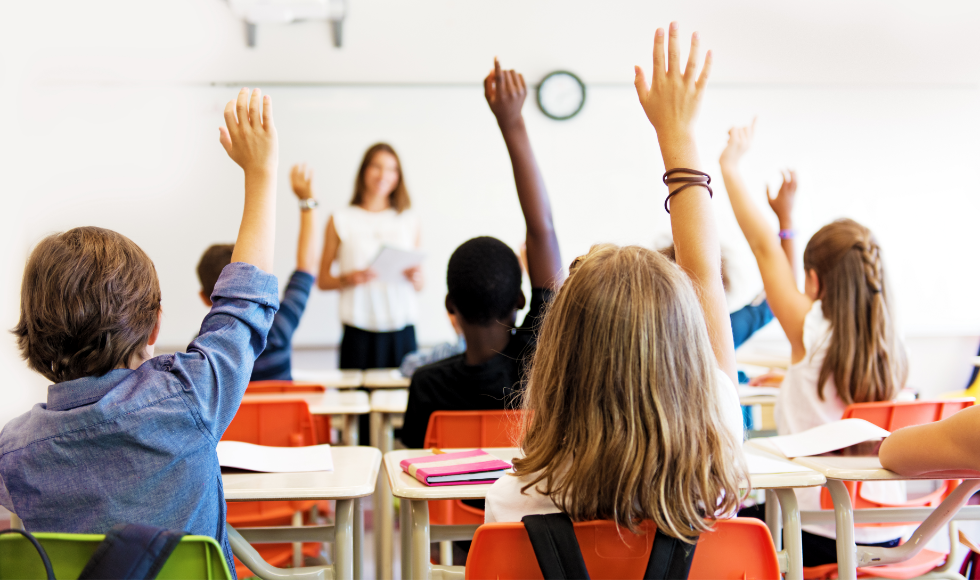Back to school: Expert advice on getting ready for the return to class

Experts with McMaster University say building routines, staying positive and preparing for common respiratory illnesses can set families up for success before heading back to school.
BY Adam Ward
August 29, 2024
The joyful days of summer vacation are coming to a close as families prepare to usher in a new school year, but before classes even begin, experts with McMaster University say building routines, staying positive and anticipating the incoming respiratory virus season can set up students of all ages for success.
Focus on the positives
Parents and children may feel a degree of anxiety and uncertainty in the lead up to the school year and through the initial few days. Magdalena Janus, a professor and researcher with McMaster’s Department of Psychiatry and Behavioural Neurosciences, says staying positive can make a big difference.
“Try not to project your own anxiety over how your child might do in school. Children are smarter than you think, even at three and four years of age, they can pick up those feelings even if you don’t necessarily say it in as many words. Instead, talk to your children about all the positive things they will experience with the return of school.”
Janus says if your child is having difficulty adjusting in the first few days, not to overreact. Instead, watch for patterns and observe their behaviours.
“If things don’t go well initially it doesn’t mean your child is going to have issues,” Janus says. “Look for patterns. If a child is doing something slightly different than before, it might just be part of their adjustment period.”
If the situation doesn’t improve with time, however, Janus recommends having a conversation with their educators.
“Educators are incredibly competent and dedicated. They really want the best for every child that’s starting school.”
Building routines
Janus says the creation of routines in the lead up to school can be an incredible help for children of all ages.
“If your child’s routine is very different during the summer, it’s very hard to make them switch come the first day of school. A little bit of preparation in the weeks before can be beneficial,” Janus says.
Routines can vary from a renewed sleep schedule, preparing lunches and backpacks the night before to building positivity. Janus says forming these routines only becomes easier with each passing school year as parents become more familiar with the demands on their children.
“It’s really the same routine every year after you start it once. You can anticipate these challenges as they come up in the months leading into school.”
Create awareness around health-care needs
There are many considerations parents need to consider in the lead up to school, but for children with allergies there is an added layer of complexity and potential anxiety.
Mariam Hanna is an assistant clinical professor with McMaster’s Department of Pediatrics. She regularly works with parents who have children with allergies.
Hanna says it’s important for parents to have a conversation with their child’s school as early as possible to explain their child’s needs and to ensure they have all the required medical information they need to provide care.
“It’s crucial to talk to the teachers early and start engaging with the school to make sure everyone is on the same page regarding your child’s allergies or other health-care needs,” Hanna says.
But it’s just as important for the child to understand their allergies and how to manage them in school. This includes teaching them not to share food, how to recognize the early warning signs of a bad reaction and how to use any medication.
“We work on making sure that the kids are prepared, that they understand the importance of not sharing food and recognizing their symptoms,” Hanna says.
Peanuts are often brought up when discussing allergies and classrooms because of the life-threatening reactions that can happen, but Hanna says schools have figured out how to mitigate the potential for exposure. It’s other, less talked about allergens — like milk, eggs, sesame, other nuts and less common food allergies — that can become problematic as teachers may not recognize these allergens as easily.
Anticipate respiratory virus season
The return to school also means the return of runny noses and coughs. Hanna says parents can expect their children to experience 10 to 12 upper respiratory illnesses in a school year.
She says it is important to monitor a child’s symptoms so they can distinguish the differences between a simple respiratory illness, versus one that may require more medical support.
“When kids go back to school, lots of respiratory viruses start going around. So, keeping an eye on symptoms is really important to ensure it doesn’t develop into something more serious,” she says.
For children with asthma, these respiratory illnesses can be even more troubling. Hanna says at the start of every school year, asthmatic symptoms spike largely due to illnesses, reduced medication use, and allergies.
“Typically, by the second and third week in September we see a spike in asthma exacerbations and admissions to the emergency departments. You can plot this year in, year out. Emergency departments kind of know it to the day when to expect this,” Hanna says.
“It’s the storm of back to school: lots of respiratory viruses, environmental allergies out of control, and then there’s the human nature factor.”
Hanna says routines drop during summer holidays making it more challenging for families to remember their routine medications including their asthma medications. It’s important to restart these routines early to ensure that your child starts the new school year on the right track.


